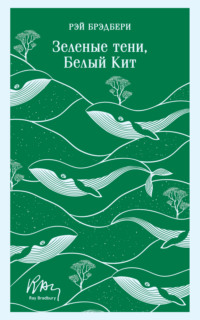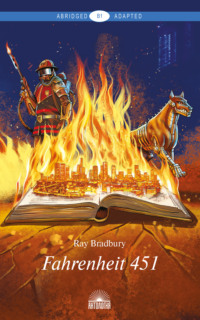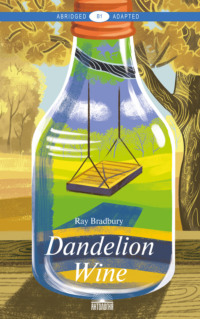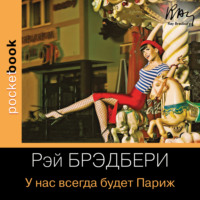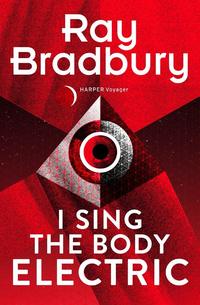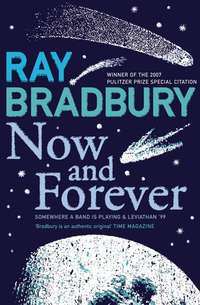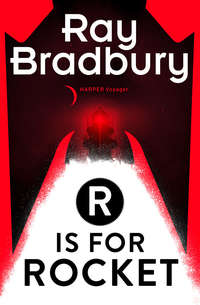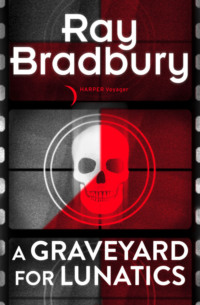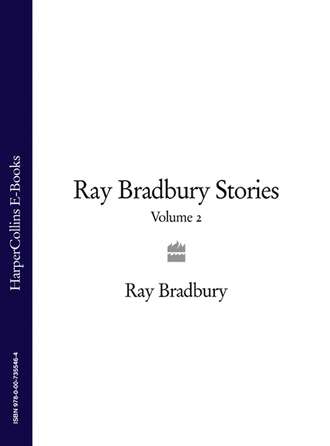
Полная версия
Ray Bradbury Stories Volume 2
He broke the spell as simply as that, strode back to the hearth and blinked at my script as if it were a brand new puzzle.
‘You ever figure, Doug, how much The Beast is like me? The hero plowing the seas, plowing women left and right, off round the world and no stops? Maybe that’s why I’m doing it. You ever wonder how many women I’ve had? Hundreds! I—’
He stopped, for my lines on the pagehad shut him again. His face took fire as my words sank in.
‘Brilliant!’
I waited, uncertainly.
‘No, not that!’ He threw my script aside to seize a copy of the London Times off the mantel. ‘This! A brilliant review of your new book of stories!’
‘What?’ I jumped.
‘Easy, kid. I’ll read this grand review to you! You’ll love it. Terrific!’
My heart took water and sank. I could see another joke coming on or, worse, the truth disguised as a joke.
‘Listen!’
John lifted the Times and read, like Ahab, from the holy text.
‘“Douglas Rogers’s stories may well be the huge success of American literature—”’ John stopped and gave me an innocent blink. ‘How you like it so far, kid?’
‘Continue, John,’ I mourned. I slugged my sherry back. It was a toss of doom that slid down to meet a collapse of will.
‘“—but here in London,”’ John intoned, “‘we ask more from our tellers of tales. Attempting to emulate the ideas of Kipling, the style of Maugham, the wit of Waugh, Rogers drowns somewhere in mid-Atlantic. This is ramshackle stuff, mostly bad shades of superior scribes. Douglas Rogers, go home!”’
I leaped up and ran, but John with a lazy flip of his underhand, tossed the Times into the fire where it flapped like a dying bird and swiftly died in flame and roaring sparks.
Imbalanced, staring down, I was wild to grab that damned paper out, but finally glad the thing was lost.
John studied my face, happily. My face boiled, my teeth ground shut. My hand, stuck to the mantel, was a cold rock fist.
Tears burst from my eyes, since words could not burst from my aching mouth.
‘What’s wrong, kid?’ John peered at me with true curiosity, like a monkey edging up to another sick beast in its cage. ‘You feeling poorly?’
‘John, for Christ’s sake!’ I burst out. ‘Did you have to do that!’
I kicked at the fire, making the logs tumble and a great firefly wheel of sparks gush up the flue.
‘Why, Doug, I didn’t think—’
‘Like hell you didn’t!’ I blazed, turning to glare at him with tear-splintered eyes. ‘What’s wrong with you?’
‘Hell, nothing, Doug. It was a fine review, great! I just added a few lines, to get your goat!’
‘I’ll never know now!’ I cried. ‘Look!’
I gave the ashes a final, scattering kick.
‘You can buy a copy in Dublin tomorrow, Doug. You’ll see. They love you. God, I just didn’t want you to get a big head, right. The joke’s over. Isn’t it enough, dear son, that you have just written the finest scenes you ever wrote in your life for your truly great screenplay?’ John put his arm around my shoulder.
That was John: kick you in the tripes, then pour on the wild sweet honey by the larder ton.
‘Know what your problem is, Doug?’ He shoved yet another sherry in my trembling fingers. ‘Eh?’
‘What?’ I gasped, like a sniveling kid, revived and wanting to laugh again. ‘What?’
‘The thing is, Doug—’ John made his face radiant. His eyes fastened to mine like Svengali’s. ‘You don’t love me half as much as I love you!’
‘Come on, John—’
‘No, kid, I mean it. God, son, I’d kill for you. You’re the greatest living writer in the world, and I love you, heart and soul. Because of that, I thought you could take a little leg-pull. I see that I was wrong—’
‘No, John,’ I protested, hating myself, for now he was making me apologize. ‘It’s all right.’
‘I’m sorry, kid, truly sorry—’
‘Shut up!’ I gasped a laugh. ‘I still love you. I—’
‘That’s a boy! Now—’ John spun about, brisked his palms together, and shuffled and reshuffled the script pages like a cardsharp. ‘Let’s spend an hour cutting this brilliant, superb scene of yours and—’
For the third time that night, the tone and color of his mood changed.
‘Hist!’ he cried. Eyes squinted, he swayed in the middle of the room, like a dead man underwater. ‘Doug, you hear?’
The wind trembled the house. A long fingernail scraped an attic pane. A mourning whisper of cloud washed the moon.
‘Banshees.’ John nodded, head bent, waiting. He glanced up, abruptly. ‘Doug? Run out and see.’
‘Like hell I will.’
‘No, go on out,’ John urged. ‘This has been a night of misconceptions, kid. You doubt me, you doubt it. Get my overcoat, in the hall. Jump!’
He jerked the hall closet door wide and yanked out his great tweed overcoat which smelled of tobacco and fine whiskey. Clutching it in his two monkey hands, he beckoned it like a bullfighter’s cape. ‘Huh, toro! Hah!’
‘John,’ I sighed, wearily.
‘Or are you a coward, Doug, are you yellow? You—’
For this, the fourth, time, we both heard a moan, a cry, a fading murmur beyond the wintry front door.
‘It’s waiting, kid!’ said John, triumphantly. ‘Get out there. Run for the team!’
I was in the coat, anointed by tobacco scent and booze as John buttoned me up with royal dignity, grabbed my ears, kissed my brow.
‘I’ll be in the stands, kid, cheering you on. I’d go with you, but banshees are shy. Bless you, son, and if you don’t come back – I loved you like a son!’
‘Jesus,’ I exhaled, and flung the door wide.
But suddenly John leaped between me and the cold blowing moonlight.
‘Don’t go out there, kid. I’ve changed my mind! If you got killed—’
‘John,’ I shook his hands away. ‘You want me out there. You’ve probably got Kelly, your stable girl, out there now, making noises for your big laugh—’
‘Doug!’ he cried in that mock-insult serious way he had, eyes wide, as he grasped my shoulders. ‘I swear to God!’
‘John,’ I said, half-angry, half-amused, ‘so long.’
I ran out the door to immediate regrets. He slammed and locked the portal. Was he laughing? Seconds later, I saw his silhouette at the library window, sherry glass in hand, peering out at this night theater of which he was both director and hilarious audience.
I spun with a quiet curse, hunched my shoulders in Caesar’s cloak, ignored two dozen stab wounds given me by the wind, and stomped down along the gravel drive.
I’ll give it a fast ten minutes, I thought, worry John, turn his joke inside out, stagger back in, shirt torn and bloody, with some fake tale of my own. Yes, by God, that was the trick—
I stopped.
For in a small grove of trees below, I thought I saw something like a large paper kite blossom and blow away among the hedges.
Clouds sailed over an almost full moon, and ran islands of dark to cover me.
Then there it was again, farther on, as if a whole cluster of flowers were suddenly torn free to snow away along the colorless path. At the same moment, there was the merest catch of a sob, the merest door-hinge of a moan.
I flinched, pulled back, then glanced up at the house.
There was John’s face, of course, grinning like a pumpkin in the window, sipping sherry, toast-warm and at ease.
‘Ohh,’ a voice wailed somewhere. ‘… God.…’
It was then that I saw the woman.
She stood leaning against a tree, dressed in a long, moon-colored dress over which she wore a hip-length heavy woollen shawl that had a life of its own, rippling and winging out and hovering with the weather.
She seemed not to see me or if she did, did not care; I could not frighten her, nothing in the world would ever frighten her again. Everything poured out of her steady and unflinching gaze toward the house, that window, the library, and the silhouette of the man in the window.
She had a face of snow, cut from that white cool marble that makes the finest Irish women; a long swan neck, a generous if quivering mouth, and eyes a soft and luminous green. So beautiful were those eyes, and her profile against the blown tree branches, that something in me turned, agonized, and died. I felt that killing wrench men feel when beauty passes and will not pass again. You want to cry out: Stay. I love you. But you do not speak. And the summer walks away in her flesh, never to return.
But now the beautiful woman, staring only at that window in the far house, spoke.
‘Is he in there?’ she said.
‘What?’ I heard myself say.
‘Is that him?’ she wondered. ‘The beast,’ she said, with quiet fury. ‘The monster. Himself.’
‘I don’t—’
‘The great animal,’ she went on, ‘that walks on two legs. He stays. All others go. He wipes his hands on flesh; girls are his napkins, women his midnight lunch. He keeps them stashed in cellar vintages and knows their years but not their names. Sweet Jesus, and is that him?’
I looked where she looked, at the shadow in the window, far off across the croquet lawn.
And I thought of my director in Paris, in Rome, in New York, in Hollywood, and the millraces of women I had seen John tread, feet printing their skins, a dark Christ on a warm sea. A picnic of women danced on tables, eager for applause and John, on his way out, saying, ‘Dear, lend me a fiver. That beggar by the door kills my heart—’
I watched this young woman, her dark hair stirred by the night wind, and asked:
‘Who should he be?’
‘Him,’ she said. ‘Him that lives there and loved me and now does not.’ She shut her eyes to let the tears fall.
‘He doesn’t live there anymore,’ I said.
‘He does!’ She whirled, as if she might strike or spit. ‘Why do you lie?’
‘Listen.’ I looked at the new but somehow old snow in her face. ‘That was another time.’
‘No, there’s only now!’ She made as if to rush for the house. ‘And I love him still, so much I’d kill for it, and myself lost at the end!’
‘What’s his name?’ I stood in her way. ‘His name?’
‘Why, Will, of course. Willie. William.’
She moved. I raised my arms and shook my head.
‘There’s only a Johnny there now. A John.’
‘You lie! I feel him there. His name’s changed, but it’s him. Look! Feel!’
She put her hands up to touch on the wind toward the house, and I turned and sensed with her and it was another year, it was a time between. The wind said so, as did the night and the glow in that great window where the shadow stayed.
‘That’s him!’
‘A friend of mine,’ I said, gently.
‘No friend of anyone, ever!’
I tried to look through her eyes and thought: my God, has it always been this way, forever some man in that house, forty, eighty, a hundred years ago! Not the same man, no, but all dark twins, and this lost girl on the road, with snow in her arms for love, and frost in her heart for comfort, and nothing to do but whisper and croon and mourn and sob until the sound of her weeping stilled at sunrise but to start again with the rising of the moon.
‘That’s my friend in there,’ I said, again.
‘If that be true,’ she whispered fiercely, ‘then you are my enemy!’
I looked down the road where the wind blew dust through the graveyard gates.
‘Go back where you came from,’ I said.
She looked at the same road and the same dust, and her voice faded. ‘Is there to be no peace, then?’ she mourned. ‘Must I walk here, year on year, and no comeuppance?’
‘If the man in there,’ I said, ‘was really your Will, your William, what would you have me do?’
‘Send him out to me,’ she said, quietly.
‘What would you do with him?’
‘Lie down with him,’ she murmured, ‘and ne’er get up again. He would be kept like a stone in a cold river.’
‘Ah,’ I said, and nodded.
‘Will you ask him, then, to be sent?’
‘No. For he’s not yours. Much like. Near similar. And breakfasts on girls and wipes his mouth on their silks, one century called this, another that.’
‘And no love in him, ever?’
‘He says the word like fishermen toss their nets in the sea,’ I said.
‘Ah, Christ, and I’m caught!’ And here she gave such a cry that the shadow came to the window in the great house across the lawn. ‘I’ll stay here the rest of the night,’ she said. ‘Surely he will feel me here, his heart will melt, no matter what his name or how deviled his soul. What year is this? How long have I been waiting?’
‘I won’t tell you,’ I said. ‘The news would crack your heart.’
She turned and truly looked at me. ‘Are you one of the good ones, then, the gentle men who never lie and never hurt and never have to hide? Sweet God, I wish I’d known you first!’
The wind rose, the sound of it rose in her throat. A clock struck somewhere far across the country in the sleeping town.
‘I must go in,’ I said. I took a breath. ‘Is there no way for me to give you rest?’
‘No,’ she said, ‘for it was not you that cut the nerve.’
‘I see,’ I said.
‘You don’t. But you try. Much thanks for that. Get in. You’ll catch your death.’
‘And you—?’
‘Ha!’ she cried. ‘I’ve long since caught mine. It will not catch again. Get!’
I gladly went. For I was full of the cold night and the white moon, old time, and her. The wind blew me up the grassy knoll. At the door, I turned. She was still there on the milky road, her shawl straight out on the weather, one hand upraised.
‘Hurry,’ I thought I heard her whisper, ‘tell him he’s needed!’
I rammed the door, slammed into the house, fell across the hall, my heart a bombardment, my image in the great hall mirror a shock of colorless lightning.
John was in the library drinking yet another sherry, and poured me some. ‘Someday,’ he said, ‘you’ll learn to take anything I say with more than a grain of salt. Jesus, look at you! Ice cold. Drink that down. Here’s another to go after it!’
I drank, he poured, I drank. ‘Was it all a joke, then?’
‘What else?’ John laughed, then stopped.
The croon was outside the house again, the merest fingernail of mourn, as the moon scraped down the roof.
‘There’s your banshee,’ I said, looking at my drink, unable to move.
‘Sure, kid, sure, unh-huh,’ said John. ‘Drink your drink, Doug, and I’ll read you that great review of your book from the London Times again.’
‘You burned it, John.’
‘Sure, kid, but I recall it all as if it were this morn. Drink up.’
‘John,’ I said, staring into the fire, looking at the hearth where the ashes of the burned paper blew in a great breath. ‘Does … did … that review really exist?’
‘My God, of course, sure, yes. Actually.…’ Here he paused and gave it great imaginative concern. ‘The Times knew my love for you, Doug, and asked me to review your book.’ John reached his long arm over to refill my glass. ‘I did it. Under an assumed name, of course, now ain’t that swell of me? But I had to be fair, Doug, had to be fair. So I wrote what I truly felt were the good things, the not-so-good things in your book. Criticized it just the way I would when you hand in a lousy screenplay scene and I make you do it over. Now ain’t that A-one double absolutely square of me? Eh?’
He leaned at me. He put his hand on my chin and lifted it and gazed long and sweetly into my eyes.
‘You’re not upset?’
‘No,’ I said, but my voice broke.
‘By God, now, if you aren’t. Sorry. A joke, kid, only a joke.’ And here he gave me a friendly punch on the arm.
Slight as it was, it was a sledgehammer striking home.
‘I wish you hadn’t made it up, the joke, I wish the article was real,’ I said.
‘So do I, kid. You look bad. I—’
The wind moved around the house. The windows stirred and whispered.
Quite suddenly I said, for no reason that I knew:
‘The banshee. It’s out there.’
‘That was a joke, Doug. You got to watch out for me.’
‘No,’ I said, looking at the window. ‘It’s there.’
John laughed. ‘You saw it, did you?’
‘It’s a young and lovely woman with a shawl on a cold night. A young woman with long black hair and great green eyes and a complexion like snow and a proud Phoenician prow of a nose. Sound like anyone you ever in your life knew, John?’
‘Thousands.’ John laughed more quietly now, looking to see the weight of my joke. ‘Hell—’
‘She’s waiting for you,’ I said. ‘Down at the bottom of the drive.’
John glanced, uncertainly, at the window.
‘That was the sound we heard,’ I said. ‘She described you or someone like you. Called you Willy, Will, William. But I knew it was you.’
John mused. ‘Young, you say, and beautiful, and out there right this moment …?’
‘The most beautiful woman I’ve ever seen.’
‘Not carrying a knife—?’
‘Unarmed.’
John exhaled. ‘Well, then, I think I should just go out there and have a chat with her, eh, don’t you think?’
‘She’s waiting.’
He moved toward the front door.
‘Put on your coat, it’s a cold night,’ I said.
He was putting on his coat when we heard the sound from outside, very clear this time. The wail and then the sob and then the wail.
‘God,’ said John, his hand on the doorknob, not wanting to show the white feather in front of me. ‘She’s really there.’
He forced himself to turn the knob and open the door. The wind sighed in, bringing another faint wail with it.
John stood in the cold weather, peering down that long walk into the dark.
‘Wait!’ I cried, at the last moment.
John waited.
‘There’s one thing I haven’t told you,’ I said. ‘She’s out there, all right. And she’s walking. But … she’s dead.’
‘I’m not afraid,’ said John.
‘No,’ I said, ‘but I am. You’ll never come back. Much as I hate you right now, I can’t let you go. Shut the door, John.’
The sob again, and then the wail.
‘Shut the door.’
I reached over to knock his hand off the brass doorknob, but he held tight, cocked his head, looked at me and sighed.
‘You’re really good, kid. Almost as good as me. I’m putting you in my next film. You’ll be a star.’
Then he turned, stepped out into the cold night, and shut the door, quietly.
I waited until I heard his steps on the gravel path, then locked the door, and hurried through the house, putting out the lights. As I passed through the library, the wind mourned down the chimney and scattered the dark ashes of the London Times across the hearth.
I stood blinking at the ashes for a long moment, then shook myself, ran upstairs two at a time, banged open my tower room door, slammed it, undressed, and was in bed with the covers over my head when a town clock, far away, sounded one in the deep morning.
And my room was so high, so lost in the house and the sky, that no matter who or what tapped or knocked or banged at the door below, whispering and then begging and then screaming—
Who could possibly hear?
One for His Lordship, and One for the Road!
Someone’s born, and it may take the best part of a day for the news to ferment, percolate, or otherwise circumnavigate across the Irish meadows to the nearest town, and the nearest pub, which is Heeber Finn’s.
But let someone die, and a whole symphonic band lifts in the fields and hills. The grand ta-ta slams across country to ricochet off the pub slates and shake the drinkers to calamitous cries for: more!
So it was this hot summer day. The pub was no sooner opened, aired, and mobbed than Finn, at the door, saw a dust flurry up the road.
‘That’s Doone,’ muttered Finn.
Doone was the local anthem sprinter, fast at getting out of cinemas ahead of the damned national tune, and swift at bringing news.
‘And the news is bad,’ murmured Finn. ‘It’s that fast he’s running!’
‘Ha!’ cried Doone, as he leaped across the sill. ‘It’s done, and he’s dead!’
The mob at the bar turned.
Doone enjoyed his moment of triumph, making them wait.
‘Ah, God, here’s a drink. Maybe that’ll make you talk!’
Finn shoved a glass in Doone’s waiting paw. Doone wet his whistle and arranged the facts.
‘Himself,’ he gasped, at last. ‘Lord Kilgotten. Dead. And not an hour past!’
‘Ah, God,’ said one and all, quietly. ‘Bless the old man. A sweet nature. A dear chap.’
For Lord Kilgotten had wandered their fields, pastures, barns, and this bar all the years of their lives. His departure was like the Normans rowing back to France or the damned Brits pulling out of Bombay.
‘A fine man,’ said Finn, drinking to the memory, ‘even though he did spend two weeks a year in London.’
‘How old was he?’ asked Brannigan. ‘Eighty-five? Eighty-eight? We thought we might have buried him long since.’
‘Men like that,’ said Doone, ‘God has to hit with an axe to scare them off the place. Paris, now, we thought that might have slain him, years past, but no. Drink, that should have drowned him, but he swam for the shore, no, no. It was that teeny bolt of lightning in the field’s midst, an hour ago, and him under the tree picking strawberries with his nineteen-year-old secretary lady.’
‘Jesus,’ said Finn. ‘There’s no strawberries this time of year. It was her hit him with a bolt of fever. Burned to a crisp!’
That fired off a twenty-one-gun salute of laughs that hushed itself down when they considered the subject and more townsfolk arrived to breathe the air and bless himself.
‘I wonder,’ mused Heeber Finn, at last, in a voice that would make the Valhalla gods sit still at table, and not scratch, ‘I wonder. What’s to become of all that wine? The wine, that is, which Lord Kilgotten has stashed in barrels and bins, by the quarts and the tons, by the scores and precious thousands in his cellars and attics, and, who knows, under his bed?’
‘Aye,’ said everyone, stunned, suddenly remembering. ‘Aye. Sure. What?’
‘It has been left, no doubt, to some damn Yank driftabout cousin or nephew, corrupted by Rome, driven mad by Paris, who’ll jet in tomorrow, who’ll seize and drink, grab and run, and Kilcock and us left beggared and buggered on the road behind!’ said Doone, all in one breath.
‘Aye.’ Their voices, like muffled dark velvet drums, marched toward the night. ‘Aye.’
‘There are no relatives!’ said Finn. ‘No dumb Yank nephews or dimwit nieces falling out of gondolas in Venice, but swimming this way. I have made it my business to know.’
Finn waited. It was his moment now. All stared. All leaned to hear his mighty proclamation.
‘Why not, I been thinking, if Kilgotten, by God, left all ten thousand bottles of Burgundy and Bordeaux to the citizens of the loveliest town in Eire? To us!’
There was an antic uproar of comment on this, cut across when the front doorflaps burst wide and Finn’s wife, who rarely visited the sty, stepped in, glared around and snapped.
‘Funeral’s in an hour!’
‘An hour?’ cried Finn. ‘Why, he’s only just cold—’
‘Noon’s the time,’ said the wife, growing taller the more she looked at this dreadful tribe. ‘The doc and the priest have just come from the Place. Quick funerals was his lordship’s will. “Uncivilized,” said Father Kelly, “and no hole dug.” “But there is!” said the Doc. “Hanrahan was supposed to die yesterday but took on a fit of mean and survived the night. I treated and treated him, but the man persists! Meanwhile, there’s his hole, unfilled. Kilgotten can have it, dirt and headstone.” All’s invited. Move your bums!’
The double-wing doors whiffled shut. The mystic woman was gone.
‘A funeral!’ cried Doone, prepared to sprint.
‘No!’ Finn beamed. ‘Get out. Pub’s closed. A wake!’


